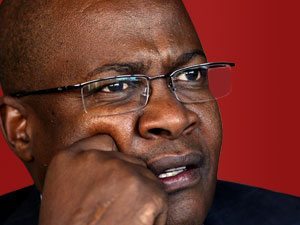
[miningmx.com] – “EVERY 50 days, there’s an executive committee meeting with divisional CEOs and COOs. We all sit in the same room and talk about targets. That way there are no surprises if someone doesn’t get a bonus.’
Those were the words of Brian Molefe, speaking to Miningmx in November 2011, about how he hoped to extract senior management performance from a disturbingly dysfunctional state-owned company.
Molefe had only been six months into his role at Transnet, a company that then shared some of the ills Eskom exhibits today, the sister company to which the he was on appointed acting CEO April 20.
Transnet had badly under-achieved on its capital projects, partly owing to a vaccum in senior management skills which saw acting managers occupying key executive roles.
Transnet had also suffered years of decline in coal railings to Richards Bay – one of the key metrics on which its operational performance was (and is) measured – at a time when the international coal market was booming.
By 2012, however, Sipho Nkosi, CEO of one of South Africa’s largest coal producers, Exxaro Resources, was moved to comment: “Transnet Freight Rail (TFR) did remarkably well in the second half of 2011 and surprised the industry with its efficiency’.
Molefe’s impact had been almost immediate.
Now, four years into a five-year contract, Transnet is viewed in a completely differently light. “Brian Molefe is renowned in South Africa for having been the head of the best-run public enterprise – logistics group, Transnet,’ said Nomura International analyst, Peter Attard Montalto.
Transnet is into the third year of a R307bn infrastructure expansion programme in which time it has kept its debt to asset ratio less than 45% in line with its mandate to The South African government, a balance sheet rigour that the near-bankrupt Eskom can only envy.
Operationally, meanwhile, the group is firmly in turnaround mode. Coal exports hit a record 71.2 million tonnes (mt) in 2014 and there are hopes for a new record of 74mt this year despite the slump in coal export prices.
It’s for these reasons that Public Enterprises minister, Lynne Brown, is hoping Molefe can pull a rabbit from the proverbial hat at Eskom. “What I need is a full-time CEO who can do the job from the get-go,’ BDLive quoted Brown to have said last week. “I need someone with a turnaround plan and skill.’
But how up for the job is Molefe really? Eskom is a beast; an unpredictable, swerving wreck.
“For me, the PIC removed the fear of scale,’ Molefe told Miningmx of his previous role at the Public Investment Corporation which he ran from from 2003 to 2010. Transnet employed 55,000 people but it wasn’t intimidating to Molefe.
“I took the PIC from managing R300bn in assets to R900bn,’ said Molefe. “You just learn to remember principles are the same whether it’s 10 people or 55,000; R10bn or R100bn, the principles are the same’.
Attard Montalto has reservations, however. Although he believes Molefe’s appointment is “welcome’, and acknowledges his leadership skills, he also believes Transnet and Eskom are, in fact, different animals entirely.
The ANC has a stronger ideological view over Eskom than at Transnet which allows Molefe less freedom to stick to those principles. Eskom’s challenges are also broader.
Whereas Transnet is a business-to-business organisation, dealing with specific projects, Eskom has “… a much larger supplier network (of fuels), a much bigger scale and a different relationship with purchasers – shielded to a large degree from end consumers through municipality supply’.
There’s also the question of whether Molefe’s appointment will be permanent. Brown would like it to be, but Molefe seems unsure.
“We’ll cross that bridge when we come to it,’ he said when asked if he would stick at Eskom for longer than the 12 months Brown appears to have given him. “The minister can’t make a full-time appointment in this way,’ said a source at Transnet. “We believe it is a secondment which must be three months,’ he said.
Right now, however, with load-shedding an intraday process, South African consumers are working on a day-by-day basis which must make Molefe’s immediate task one of stopping the rot and asking questions later.











